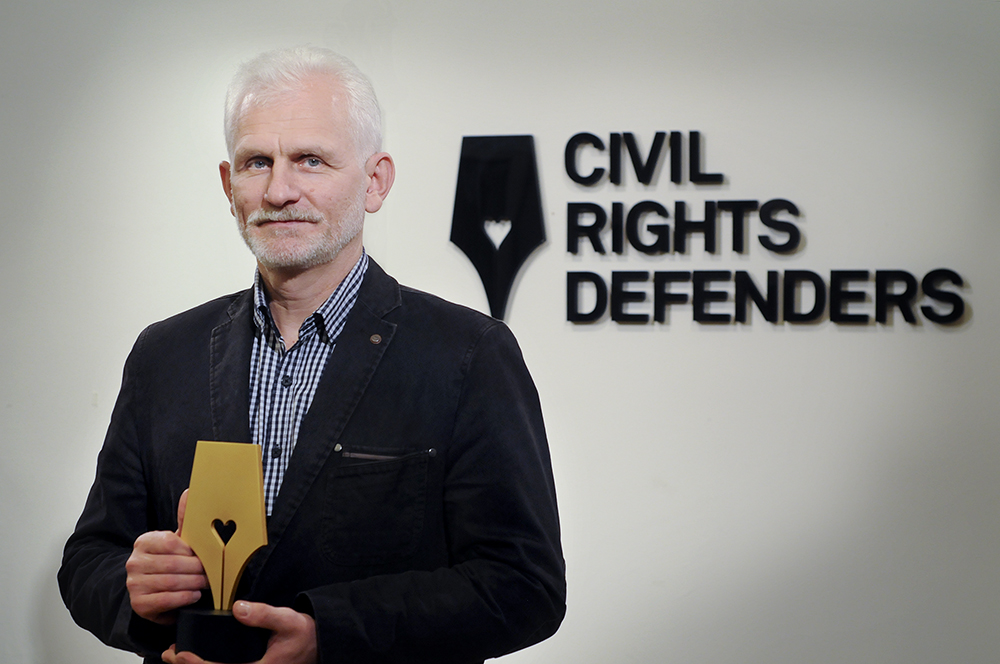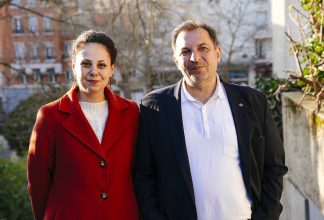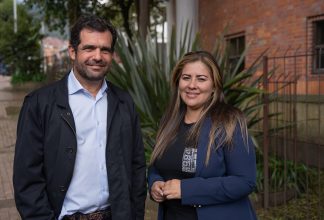Civil Rights Defender of the Year 2014 – Ales Bialiatski
Ales Bialiatski, founder of the Belarusian human rights organisation Viasna, is the recipient of the 2014 Civil Rights Defender of the Year Award. For over 30 years, he has pursued a life of continuous struggle to campaign for democracy and human rights, first in the Soviet Union and then in Belarus.
Ales is one of eleven political prisoners in Belarus, sentenced to 4.5 years in prison for tax evasion in a trial with clear political overtones. He was arrested on 4 August 2011. Since then he has been imprisoned and prevented from communicating freely with the outside world. Being the head of the country’s leading human rights organisation Viasna Ales Bialiatski is a central figure in Belarusian civil society. Valiantsin Stefanovitj is vice president of Viasna:
“It is important for Ales to receive this recognition. He is a strong and warm person who is extremely passionate about democracy and human rights. An external show of support like this award, goes a long way to strengthening both him and all of us at Viasna and also provides the inspiration to continue to fight for a democratic Belarus. Only with pressure from the outside world can we bring about long lasting change. It was really exciting for me to write the letter to Ales and tell him about the prize. Unfortunately I do not know if the letter arrived as we have not yet received a response,” said Valiantsin.
Since the establishment of Viasna in 1996, Ales has been arrested over 20 times. Many of these arrests have been for minor infringements such as handing out copies of the Universal Declaration of Human Rights.
“The trial of Ales Bialiatski was initiated despite international protests and demands for his release. The process of prosecuting Ales was directly linked to his human rights work and the verdict serves as a warning to the entire Belarusian civil society”, said Robert Hårdh, Executive Director of Civil Rights Defenders.
According to those who have been in contact with him, Ales, maintains his indomniable spirit but is showing signs of deteriorating health. According to Valiantsin Stefanovitj, Belarusian prisoners are frequently exposed to torture and degrading treatment. Ales has previously been honored with several other awards, including the Swedish Per Anger Prize, the Václav Havel Prize and the Homo Homini Prize. He has been nominated for the Nobel Peace Prize twice, in 2006 and 2007.
His colleague Tatsiana Revjaka and his wife Natalia Pinchuk will come to Stockholm to receive the prize on his behalf. The Civil Rights Defender of the Year Award is given out on 4 April, which is the anniversary of the assassination of Dr. Martin Luther King. The award is given to coincide with Civil Rights Defenders’ annual conference Defenders’ Days when human rights defenders from around the world gather in Stockholm.
About Viasna
Viasna helps thousands of people every year, mainly through the provision of free legal aid. In 2003 the authorities withdrew the organisation’s registration certificate – a clear violation of freedom of association under the UN Human Rights Committee. After several failed attempts to re-register, Viasna works without permission from the authorities – a violation that can result in up to two years in prison. The Belarusian security service, the KGB, constantly monitor their activities. Nevertheless they continue to work for human rights in Belarus.
About Belarus
Belarus became independent in 1991 with the dissolution Soviet Union. The country has been ruled by Alyaksandr Lukashenka since 1994. Belarus is the only country in Europe still using capital punishment. The situation for human rights defenders in Belarus has reached a new low since the 2010 presidential election, when the regime launched a massive campaign against civil society in which the right to freedom of assembly and freedom of association is routinely violated. During the post-election demonstrations in 2010 over 700 people were arrested by the security forces. Organisations and political parties are denied permission to register their organisations with those who are unable to register being banned from working in Belarus. Operation of such an organisation without the necessary state permit can result in several years in prison.



